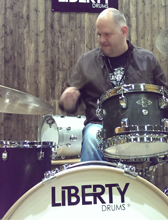PHYSICAL VERSUS AUDIBLE - A GREAT WAY TO MOTIVATE YOURSELF!
Posted on Fri 02 May 2014 in entries
As we all know, practice is the key to success (in pretty much all things), but sometimes we hit a rut, or just don't seem to be improving. It happens to the best of us! And that's when the passion for our drumming, the motivation, can sometimes dwindle. Frustration sets in and the idea of practice, because we feel it isn't working, just doesn't appeal.
So how about this for a morale booster when you find yourself in this situation? It's all about the difference between what your limbs might be feeling, and the sound your limbs are actually producing (well, the drums, if you get my drift!).

Here's the rub: always keep upper most in your mind that how your hands, for example, might FEEL when you play, say, a paradiddle, will not necessarily reflect the actual SOUND you are producing.
A good example is the weaker hand. You are playing this paradiddle, and your strong hand feels fine, but your weak hand feels as if it is making more effort today, just to keep up. So, quite naturally, you think what you are playing is sounding awkward, or uneven, simply because the feedback from your weak hand is FEELING stiff, or slow.
Now here's the motivational part, and so many of my students have tried this and been spurred on by its results - record that paradiddle and listen back to it. Almost every time, you will find that the SOUND you produced is much more even or better executed than you FELT at the time. Listening back, without the physical feedback from your hands or feet etc, gives you the chance to assess your performance objectively, audibly - not subjectively.
Not only will you find your playing is better than you thought, but from a practice point of view, when you are in that rut, if you listened, say at the end of each week, even though your limbs might say 'I'm not improving', the playback will be a clear indication that you ARE improving.
Try it. It really does help - but don't expect changes all the time. Give yourself intervals to improve, then use this assessment idea - you will find it motivates you when you HEAR even the smallest improvement that you missed whilst ACTUALLY PLAYING it.
This article was written by Ian Bee, a professional drummer, Liberty Drums Artist and tutor from Bletchey in Buckinghamshire. If you would like to learn more about Ian, please visit his website: www.ianbdrums.co.uk
To browse our range of drums, kits, cymbals, percussion and accessories online, CLICK HERE.